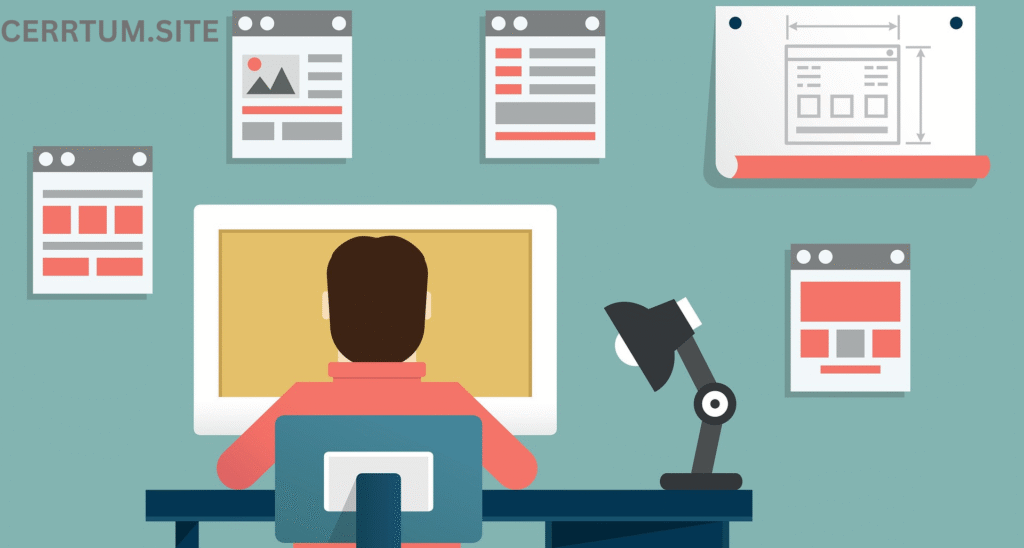One of the most sought-after talents worldwide in the quickly changing digital era is web development. From local companies to global ones, every company needs a strong digital presence. The need for talented web developers is therefore always rising. A web development internship is a unique chance for future developers to acquire practical knowledge, hone technical abilities, and start a fulfilling tech career.
Whether your path to professional success is computer science, self-taught coding, or someone switching into tech from another discipline, a web development internship might be the key. This extensive article will go over what a web development internship is, what skills you need, what to anticipate, how to acquire one, and the best way to maximize it.

What is a Web Development Internship?
Companies give temporary work experience known as a web development internship to students or future developers so they may learn how to create and manage websites and online apps practically. Usually lasting a few weeks to many months, these internships might be part-time or full-time.
You work on actual projects under the direction of seasoned developers during the internship. You could help with quality assurance, coding, website design, or debugging. The aim is to provide practical experience that balances academic knowledge.
Why Pursue a Web Development Internship?
Here are some compelling reasons why pursuing a web development internship is highly beneficial:
1. Gain Practical Experience
Theoretical knowledge is important, but real-world experience is crucial. Internships allow you to work on actual projects, face real challenges, and understand how development works in a professional environment.
2. Build a Portfolio
Your portfolio is a powerful tool when applying for jobs. An internship gives you the opportunity to create or contribute to live websites or applications that you can showcase to future employers.
3. Learn Industry Tools and Best Practices
Internships expose you to tools, frameworks, and workflows used by professional developers, such as version control (Git), deployment tools, collaborative platforms (GitHub, Jira), and more.
4. Network with Professionals
Internships help you connect with professionals in the industry. These connections can lead to job offers, mentorship, or future collaborations.
5. Enhance Your Resume
Having a web development internship on your resume shows initiative, experience, and commitment to your career path, giving you a competitive edge.
Types of Web Development Internships
Web development encompasses various specializations. Depending on your interests and skills, you can choose an internship in one of the following areas:
1. Frontend Development
Focuses on building the visual components of a website. Interns learn HTML, CSS, JavaScript, and libraries like React, Vue.js, or Angular.
2. Backend Development
Involves server-side programming, databases, and APIs. Languages like Node.js, Python, PHP, Ruby, and tools like Express, Django, and MongoDB are commonly used.
3. Full-Stack Development
Combines both frontend and backend responsibilities. Interns gain comprehensive skills across the entire web development stack.
4. Web Design/UI/UX Internships
Focuses on the design and user experience aspects, including wireframes, prototypes, and layout design using tools like Figma, Adobe XD, or Sketch.
Skills You Need for a Web Development Internship
Before applying for a web development internship, it’s helpful to have a foundational understanding of the following skills:
Technical Skills:
-
HTML & CSS – Basics of structuring and styling web pages.
-
JavaScript – Fundamental programming logic and interactivity.
-
Responsive Design – Using media queries and frameworks like Bootstrap.
-
Git & GitHub – Version control and collaboration.
-
Basic Backend Knowledge – Understanding of databases and server-side scripting.
Soft Skills:
-
Communication – Explaining ideas and asking for help clearly.
-
Teamwork – Collaborating with designers, developers, and project managers.
-
Problem-Solving – Debugging issues and finding efficient solutions.
-
Time Management – Meeting deadlines and prioritizing tasks.
-
Willingness to Learn – Staying curious and open to feedback.
You don’t need to master everything before starting—internships are learning experiences. But demonstrating initiative and a strong grasp of the basics goes a long way.
What to Expect During a Web Development Internship
The specifics of your internship will depend on the company, your role, and your skill level. However, most web development internships will include:
1. Onboarding and Training
You may start with an introduction to the company’s codebase, tech stack, and internal tools. Some companies provide structured onboarding programs.
2. Working on Projects
Interns typically assist with ongoing projects—fixing bugs, writing features, or improving UI components. In smaller teams, you may take ownership of an entire module.
3. Code Reviews
Expect your code to be reviewed by senior developers. This is a great opportunity to learn best practices and coding standards.
4. Mentorship and Feedback
You may be assigned a mentor or team lead who provides guidance, answers questions, and gives regular feedback to help you grow.
5. Team Meetings
You’ll likely participate in stand-ups, sprint planning, or review meetings as part of the Agile process. This gives insight into project management and team dynamics.
How to Get a Web Development Internship
Landing a web development internship requires effort and strategy. Here’s how to increase your chances:
1. Build a Solid Portfolio
Create a GitHub profile and upload personal projects, class assignments, or freelance work. A few well-crafted websites or apps can speak louder than a resume.
2. Create a Personal Website
Showcase your skills, projects, resume, and contact info on a personal website. This demonstrates initiative and design skills.
3. Write a Great Resume and Cover Letter
Tailor your resume to highlight relevant skills, projects, and education. Your cover letter should explain why you’re interested in the internship and what you can offer.
4. Leverage Online Platforms
Use platforms like:
-
LinkedIn
-
Indeed
-
Glassdoor
-
Internshala (India)
-
AngelList (for startups)
-
GitHub Jobs
Also check company websites for internship listings.
5. Apply Early and Widely
Internships are competitive, so apply to multiple companies. Don’t wait for deadlines—many positions fill on a rolling basis.
6. Ace the Interview
Be ready to:
-
Discuss your projects
-
Answer technical questions (HTML/CSS/JS)
-
Demonstrate problem-solving
-
Show enthusiasm for learning
Some companies may ask for a coding challenge or project assignment.
How to Succeed in Your Web Development Internship
Once you land the internship, make the most of it. Here’s how:
1. Ask Questions
Don’t be afraid to ask for help when stuck. It shows you’re engaged and eager to learn.
2. Take Notes
Document what you learn each day—commands, tools, debugging tips. This builds your personal knowledge base.
3. Be Proactive
If you finish a task, ask for more. Volunteer for challenging assignments to learn faster.
4. Embrace Feedback
Constructive criticism helps you improve. Listen actively, apply suggestions, and don’t take it personally.
5. Build Relationships
Network with team members. Connect on LinkedIn. These connections can lead to mentorships or job opportunities.
6. Track Your Progress
Maintain a journal of what you’ve learned and achieved. This is useful for future job applications and interviews.
What Happens After the Internship?

A successful web development internship can open several doors:
1. Full-Time Job Offers
Many companies hire interns who perform well. Your internship can be a direct pathway to employment.
2. Better Job Prospects
Even if you move on, your internship adds weight to your resume. Employers value hands-on experience.
3. Freelancing Opportunities
With skills and a portfolio, you can take on freelance projects or even start your own web development business.
4. Further Learning
Your experience may reveal areas where you want to specialize—perhaps in frontend frameworks, DevOps, or UI/UX design.
Remote Web Development Internships
Many internships today are remote, especially post-pandemic. Remote internships offer flexibility and allow you to work for companies in different cities or countries. However, they require strong communication skills, discipline, and self-motivation.
Tips for succeeding in a remote internship:
-
Have a dedicated workspace
-
Use tools like Slack, Zoom, and Trello
-
Maintain regular check-ins with your supervisor
-
Be proactive in communication and updates
Final Thoughts
More than simply a résumé builder, a web development internship is a transforming experience bridging the gap between academic knowledge and professional growth. An internship provides the real-world experience, mentoring, and exposure required to succeed in the IT business regardless of your goals—frontend wizard, backend specialist, or full-stack developer.
Start early, be inquisitive, and regard your internship as a learning opportunity rather than as employment. Your web development internship might be the initial step toward an intriguing, fast-growing tech career with the correct attitude and work.